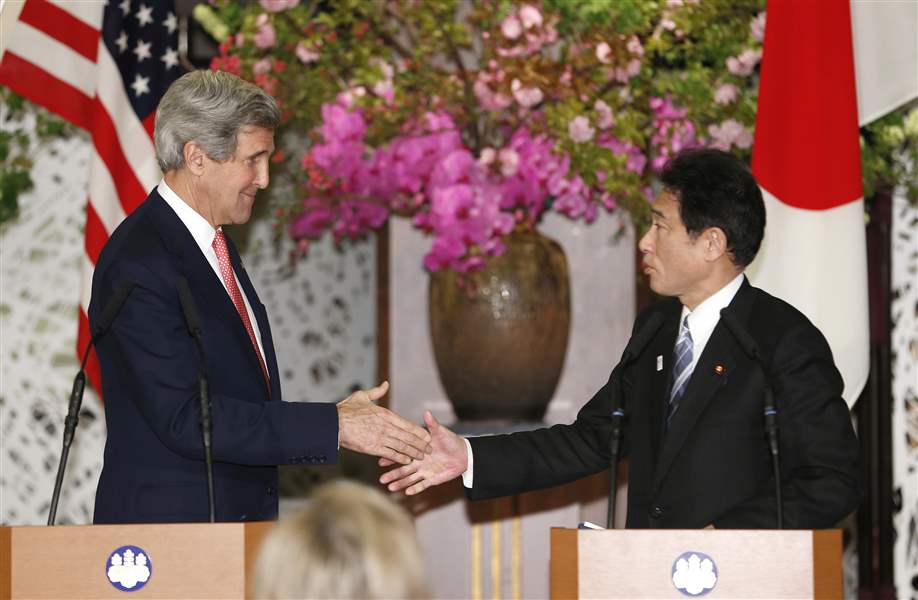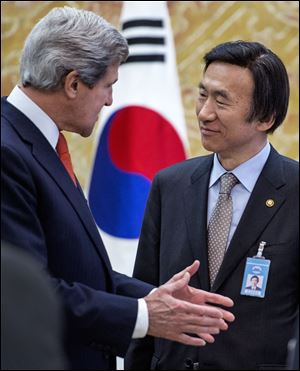
U.S. open to direct contact with N. Korea, Kerry says
Appeal issued for step back from threat of war
4/15/2013
U.S. Secretary of State John Kerry shakes hands with Japanese Foreign Minister Fumio Kishida in Tokyo. Japan said Sunday that it is open to talks with North Korea if Pyongyang honors previous agreements.
ASSOCIATED PRESS

John Kerry and South Korea's Foreign Minister Yun Byung-se share a few words during the U.S. secretary of state's first-ever visit to Seoul.
TOKYO — U.S. Secretary of State John Kerry invited North Korea to resume disarmament talks, appealing Sunday for a step back from the threat of war even as the North may be ready to test-launch a missile capable of hitting Japan or U.S. bases in the Pacific.

U.S. Secretary of State John Kerry shakes hands with Japanese Foreign Minister Fumio Kishida in Tokyo. Japan said Sunday that it is open to talks with North Korea if Pyongyang honors previous agreements.
He opened the possibility of new direct contacts between the United States and North Korea, something Pyongyang has sought before as a way to guarantee that the United States will not attack.
Mr. Kerry offered no such bargain, but he made clear that the failure of past negotiations will not prevent him from making another attempt.
“We’re prepared to reach out” to North Korean leader Kim Jong Un, Mr. Kerry said. That would require “the appropriate moment and the appropriate circumstance.” He added he was speaking personally.
A State Department official said afterward that the United States has made no official offer of new government-to-government talks.
“Our position hasn’t changed and there are no plans to move toward direct talks, because North Korea has shown no willingness to move in a positive direction,” said the official, who spoke on the condition of anonymity to clarify Mr. Kerry’s remarks.
Given that former NBA star Dennis Rodman is the most prominent American to have met with the 30-year-old Kim, Mr. Kerry said a meeting with a more traditional envoy may be forthcoming.
“It may be that somebody will be asked to sit down,” Mr. Kerry told reporters who traveled with him to the three main U.S. allies in Asia — visits overshadowed by the threat of conflict with North Korea.
Japan was Mr. Kerry’s final stop on a 10-day world trip.
Diplomatic advances with China, North Korea’s most important ally and underwriter, offer the promise of drawing the North back to talks that could rid the Korean Peninsula of nuclear weapons, Mr. Kerry said.
The North has conducted three nuclear tests and is thought to be moving toward a full nuclear weapons capability. Its government has called nuclear weapons a fundamental part of its identity and vowed it will never give them up.
New talks would be aimed at giving the North a reason to reverse that stance.
Diplomats in South Korea, China, and Japan have pledged to explore the possibility despite a history of concessions to North Korea that have not stopped its nuclear development.
Of the three, South Korea sounded the most eager for negotiations, Japan the least.
Both would be on the front lines of any conflict with North Korea, and Mr. Kerry repeated at each stop that the United States would defend its allies.
Meanwhile, the Associated Press reported that North Korea had rejected Seoul’s proposal to resolve rising tensions through dialogue, calling it a “crafty trick.”
Japanese Foreign Minister Fumio Kishida said North Korea must honor commitments made in previous negotiations to scale back its nuclear and missile program.
Japan also insists on a restatement of North Korean intent to resolve cases of Japanese citizens allegedly abducted by the North.
North Korea has readied midrange missiles for a probable test launch meant to show that it can attack U.S. allies and bases.
The missiles have a range of about 2,500 miles, putting South Korea, Japan, and U.S. bases in those nations and on Guam at risk.
North Korea regularly ignores U.N. Security Council prohibitions on such missile launches and nuclear tests and it has reneged on disarmament pledges from past negotiations.
Pyongyang recently said it would restart a nuclear reactor whose closure was the only lasting accomplishment from fitful international bargaining that included the United States.
Those talks, which included direct U.S.-North Korean discussions on the sidelines, fell apart nearly four years ago. Another effort failed in the 1990s.
Mr. Kerry said he is stepping carefully.
“We spent years in the same dynamic, so it’s fair to try to require some indicator of good faith that the dynamic is going to be different,” he said.
“I’m open personally to exploring other avenues,” maybe through China. “I’m not going to be so stuck in the mud that an opportunity to actually get something done is flagrantly wasted.”
Before flying back to the United States, Mr. Kerry told students today at the Tokyo Institute of Technology that the important thing was staying united on North Korea.
He also was scheduled to meet Japanese Prime Minister Shinzo Abe.
In Washington, Republican lawmakers have largely backed the Obama Administration’s efforts on North Korea.
U.S. Sen. Marco Rubio (R., Fla.) told CBS’ Face the Nation that he was encouraged by Mr. Kerry’s visit to China and that he hoped “we can get the Chinese to care more about this issue.”
U.S. Sen. John McCain of Arizona suggested on CNN’s State of the Union that the United States make a counter-threat by using missile interceptors to hit any North Korean missile that is test-fired.
At each stop along his trip, Mr. Kerry stressed that the United States wanted a peaceful resolution of the North Korea situation six decades after a cease-fire ended the Korean War.
But North Korea on Sunday served a reminder of the difficult task ahead.
Its Committee for the Peaceful Reunification of Korea said the government had no intention of talking with Seoul unless the South abandons its confrontational posture, as the North called it.